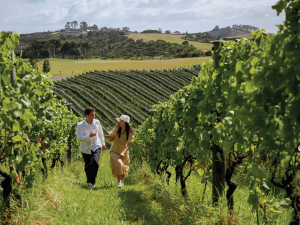The global wine industry is experiencing its first “demand-based correction” after three decades of sustained growth, according to the Silicon Valley Bank’s State of the Wine Industry Report 2025.
Report author Rob McMillan, one of the top wine-business analysts in the United States, says there are myriad reasons for a global “pulling back” in wine, including anti-alcohol lobbies and a generational shift from baby boomers. “The story begins at the end of World War Two,” says Rob, whose research is focused on the US but is pertinent beyond its borders.
As soldiers returned and economies rallied, conditions were ripe for many industrialised countries, including the world’s wine-consuming nations, to experience large population increases. “Each population boom coincided with a social evolution of wine in society,” Rob says. “Specifically, as it relates to the United States, the baby boomer generation had a perfect set of circumstances that drove higher consumption of premium wine.”
From 1994, the US experienced 25 consecutive years of higher wine consumption volume, becoming the largest wine-consuming country in the world, Rob says. “That trend started to flatten, and it finally reversed in 2018. That is coincident with the retirement of the boomer generation.” Subsequent generations do not index as highly in wine consumption, compared to other alcoholic beverages, resulting in a constant negative growth rate in wine, and now in all alcoholic beverages.
But the reason for the decline in consumption is more complex than an aging cohort, with anti-alcohol campaigns “weaponising science and using it as a marketing tool”, Rob says. “The phrase ‘no safe amount’, or the notion that your cancer risk increases with the first drop consumed, is nonsense.” He cites a report released by NASM, a body of the US Government, at the end of 2024, that concluded that, “compared with never consuming alcohol, moderate alcohol consumption is associated with lower all-cause mortality (moderate certainty).” But in January this year the US Surgeon General said, “alcohol consumption is the third leading preventable cause of cancer, after tobacco and obesity”. With two agencies coming to opposite conclusions on the science, “it’s becoming clearer that this is about politics instead of science”, Rob says. “The wine industry is collateral damage in that battle.”
Key Strategies for Growth
Silicon Valley Bank conducts two industry surveys annually: one that targets broader industry metrics and another that focuses on direct-to-consumer business. In June, the bank received 500 responses to a survey seeking to understand what wineries are doing to attract consumers aged 30-46.
The results showed that enhancing the tasting room experience was a successful strategy, including hiring and training staff with the right skillsets, expanding wine club membership, and offering personalised experiences, such as special programmes for wine clubs and enhancing personal interactions with all consumers.
Marketing and engagement were also key, including digital marketing, with improved email programmes, content quality and recipient list growth. Local partnerships were another initiative, along with event programming, social media strategies and targeted marketing.
Survey recipients were focusing on new distributor partnerships, securing distributors in key markets, such as the West Coast and Midwest, to achieve broader reach. They also talked of innovative offerings, introducing new products that could include non-wine beverages to appeal to a broader audience.
In terms of navigating challenges, recipients talked of “political landscape awareness”; addressing anti-alcohol campaigns; and adapting pricing strategies.
Rob McMillan is speaking at the New Zealand Winegrowers Wine Business Forum 2025 in Ōtautahi Christchurch on 28 August. nzwine.com/en/initiativesevents/nzw25/wbf











